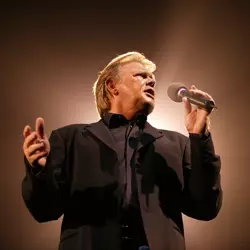 John Farnham
John FarnhamNational headlines were made when John Farnham’s recording of You’re The Voice was announced as the feature in a new advertisement supporting “Yes” in The Voice referendum.
While many have focused on the song and its lyrics - almost as if it had been written yesterday and for this cause - You’re The Voice has had a much longer and larger life than Farnham. And no, he didn’t write it – the authors are written by Andy Qunta, Keith Reid, Maggie Ryder, and Chris Thompson.
A quick Spotify sweep gives at least 50 recorded cover versions - including Kate Miller-Heidke, Alan Parsons, a supergroup of Archie Roach, Kate Ceberano, Katie Noonan, Troy Cassar-Daley, Montaigne and Isaiah (as part of a campaign against domestic violence), as well as several full orchestra performances too.
YouTube throws up at least twice as many more, including Casey Donovan, Delta Goodrem, and the Norwegian Military Tattoo. Is the last one just for uber bagpipe action? Perhaps. For those who just can’t get enough ‘voice’, there is already a huge range of genres and eras represented, all drawn to the pull of the lyric and the hooky chorus - woah-oh-woah-oh, awoah-oh a-oh.
Don't miss a beat with our FREE daily newsletter
The Uluru Dialogue/History is Calling campaign could simply have licensed a cover of You’re The Voice just like others have beforehand. Or reused a symphonic or updated instrumental. Mitch Tambo’s stunning Gamilaraay translated version would also have been stunning to listen to, as it has been at regular performances for January 26 and other iconic moments of performance.
Interestingly, Tambo performed his version at the ad launch, saying, “Tonight I had the honour of stepping in for Uncle John Farnham to lead the iconic Farnham band in singing You’re The Voice.”
Tonight I had the honor of stepping in for Uncle John Farnham to lead the iconic Farnham band in singing You’re The Voice to which will be a memory I look back on for many years to come pic.twitter.com/TTFLkXGiZz
— MitchTambo (@MitchTambo) September 3, 2023
By using Farnham’s version and his 1980s version (he’s also recorded several since), the campaign is really using popular music as a powerful weapon. The original version is part of Australian culture of a time that Farnham still speaks to and arguably for. A British-born immigrant now in his 70s, he rose to fame in the very middle of the mainstream as a teen idol and television-friendly pop star. His first hit, Sadie The Cleaning Lady, was released in 1967 - the same year over 90% of voters said ‘yes’ in a referendum to finally include First Nations people in the Constitution as part of the Australian population.
You’re The Voice was a comeback for Farnham but also an introduction to a new audience - the girls and boys who may have loved him in the late 60s sang with their kids in the 80s. Although still on high rotation, Farnham is a beloved nostalgic icon these days rather than part of the cutting edge. Unlike Paul Kelly or even AC/DC, he is no longer a regular live performer, having famously ‘retired’ from the industry in 2002 (ish).*
Farnham seldom lends his actual voice (or perspective) to political commentaries or public debate. This includes commentaries deliberately designed to celebrate him, including Jane Gazzo’s excellent 2015 biography John Farnham: The Untold Story, Graeme Turner’s 33 ⅓ book focusing on Whispering Jack, and, of course, Poppy Stockell’s recent record-breaking documentary, John Farnham: Finding the Voice. In each case, Farnham is the focus but does not actually present himself. As Gazzo put it in her book, Farnham’s hesitation to speak means “there have been other forgotten voices from his past who have been able to tell their story”.
Apparently, when asked to participate in retrospectives, Farnham has said he prefers to look forward rather than back, making this support for the History is Calling campaign even more striking. This is a person who was awarded Australian of the Year on January 26, 1988 - the bicentennial anniversary of Arthur Philip’s arrival in Sydney, and also a day of great pain for First Nations peoples.
Interestingly, part of his speech on that day is included in the new campaign ad - not just for the glorious mullet (delightful) - but also for the type of speaker he is. A larrikin who would rather laugh at himself than talk, as his voice stumbles, he asks that we instil national pride in our children but that we do that to encompass humanity.
Having 1980s Farnham behind this campaign is a direct appeal to the people who see him as an icon. He is the most mainstream of mainstream - right there in ‘ordinary Australia’ - on playlists in supermarkets and ‘classic hits’ radio and in family music libraries. He is gloriously daggy with his heart on his sleeve but ‘nice’ in the best way.
He is less overtly political than Midnight Oil and ‘Oz Rock’ than Jimmy Barnes - there’s an ‘every person’ vibe about him. Outsiders looking in might call him a local Michael Bublé (although, given the age difference, maybe Bubes takes cues from Farnesey), and perhaps his version of Australia is comparable to the politics/mainstream dodge that is Dolly Parton’s America.
It’s maybe easy to assume Farnham is just a ‘heritage piece’. But he is also still someone who audiences are still very interested in - with Stockell’s documentary the most successful Australian doco of all time to date. There’s no question he has a broad intergenerational appeal - and being less blokey than his contemporaries helps, too. If Barbie has taught (or reminded us) of anything, it’s that women, girls and those who don’t identify with some stereotypical forms of ‘Aussie masculinity’ are a powerful commercial force.
What’s even more powerful is having John Farnham today, looking back, deciding that now is the time to let this version of himself be reimagined. In doing so, he’s inviting his audience to do the same - to reimagine how they see themselves historically and how they go forward.
Whether or not you agree with his answer to the question, it’s really hard to deny how culturally important it is to have someone of Farnham’s stature give their name, historical voice, and position to something for the future.
*Don’t send hate mail. I know it was a farewell, not a retirement. I went to the concert. And the others after it. I’d still be down the front tomorrow if he came back - shamelessly, what a legend.
















